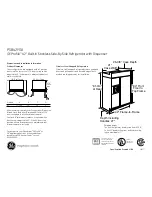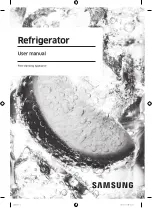
~
Do not use sharp edged objects to
– remove frost and ice,
– separate food which has become
frozen.
They will damage the evaporator,
causing irreversible damage to the
appliance.
~
Do not use defrosting sprays or
de-icers, as they might contain
substances which could damage the
plastic parts or which could cause a
build-up of gases and pose a danger to
health.
~
Do not use any oils or grease on the
door seal as these will cause the seal to
become porous with time.
~
Do not store cooking oil in the
refrigerator door. Traces of oil can
cause stress cracks to occur in the
plastic components in the door.
~
Do not block the ventilation gap in
the plinth or the top of the appliance
housing unit as this would impair the
efficiency of the appliance, increase
the electricity consumption and could
cause damage to the appliance.
~
The appliance is designed for use
within certain climate ranges (ambient
temperatures), and should not be used
outside this range. The climate range
for your appliance is stated on the data
plate inside the appliance.
Installing it in a room with too low an
ambient temperature, e.g. a garage,
can lead to the appliance switching off
for longer periods so that it cannot
maintain the required temperature.
~
Never use a steam-cleaning
appliance to clean this appliance.
Pressurised steam could reach the
electrical components and cause a
short circuit.
Disposal of your old appliance
~
Before disposing of an old
appliance first make the door latch or
lock unusable.
This way you will prevent children from
accidentally locking themselves in and
endangering their lives.
~
Be careful not to damage any part of
the pipework whilst awaiting disposal,
e.g. by
– puncturing the refrigerant channels
in the evaporator.
– bending any pipework.
– scratching the surface coating.
Splashes of refrigerant can damage the
eyes.
The manufacturer cannot be held
liable for damage caused by
non-compliance with these Warning
and Safety instructions.
Warning and Safety instructions
11












































